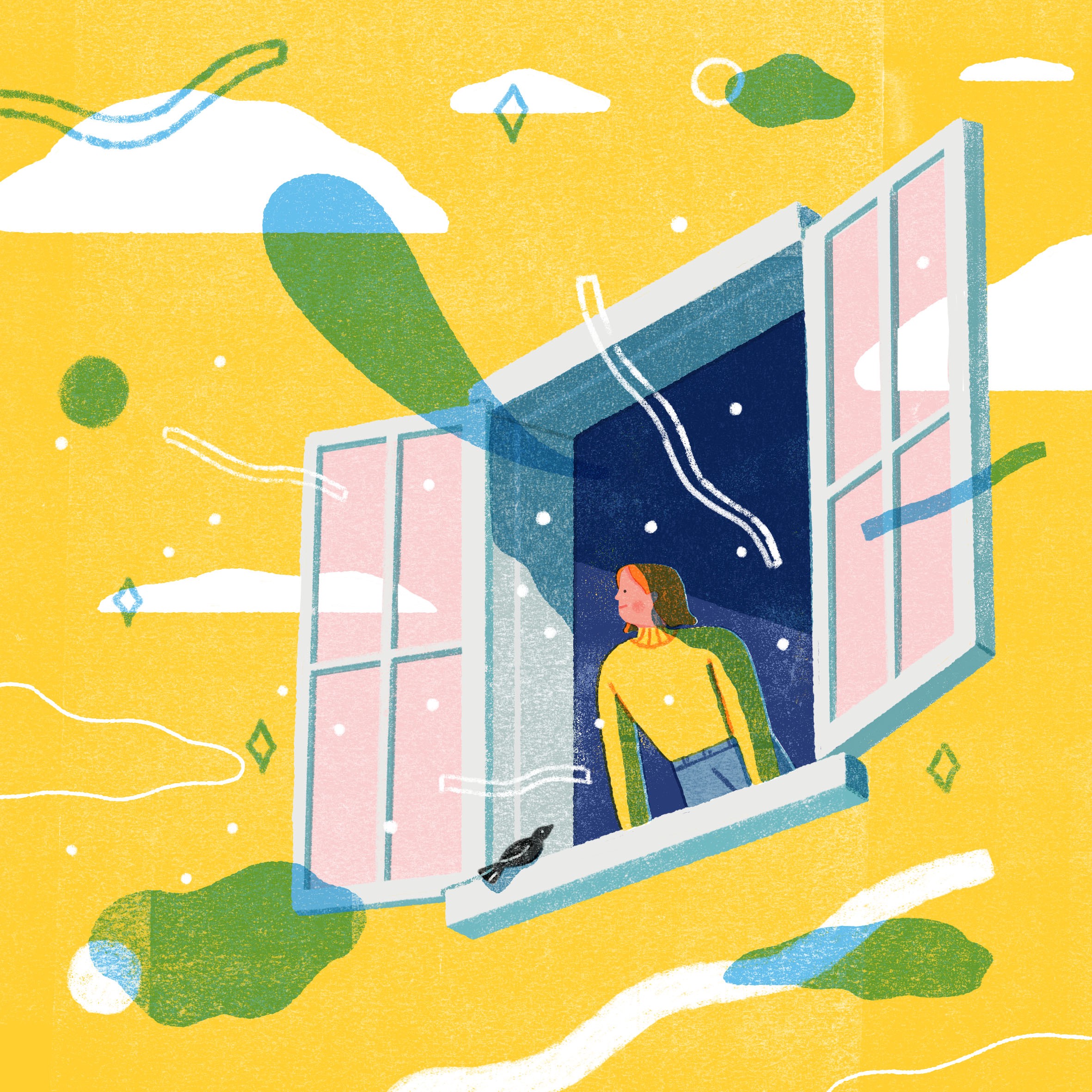 Illustration: Kieran Blakey
Illustration: Kieran Blakey
The Nuance
Let the breeze blow those pathogens away
![]()
Markham Heid
Apr 95 min read
 Anyone who?s been cooped up in a stuffy, stagnant room can appreciate the simple pleasure of an open window and a fresh breeze. Breathing clean outdoor air may even provide some cognitive benefits: If a space is small and poorly ventilated, there?s evidence that accumulated C02 can cause drowsiness, poor concentration, and other symptoms.
Anyone who?s been cooped up in a stuffy, stagnant room can appreciate the simple pleasure of an open window and a fresh breeze. Breathing clean outdoor air may even provide some cognitive benefits: If a space is small and poorly ventilated, there?s evidence that accumulated C02 can cause drowsiness, poor concentration, and other symptoms.
More importantly, open windows can prevent viruses and other pathogens from spreading. A 2019 study in the journal BMJ Infectious Diseases found that windows and other sources of natural ventilation can reduce the transmission of tuberculosis by 72%. And in developing countries, where expensive ventilation systems are not affordable, hospitals often rely on open windows and fans to encourage indoor-outdoor air exchange.
In the midst of the Covid-19 crisis, public health officials in the U.S. are increasingly trumpeting the benefits of open windows and fresh air. The Centers for Disease Control and Prevention (CDC) recommends opening windows to reduce the spread of coronaviruses, and state health departments are encouraging the same measures to slow the transmission of Covid-19, specifically.
?Changing the room air is a widely used measure for infection prevention and control,? says Stephen Morse, an infectious disease researcher and professor of epidemiology at Columbia University?s Mailman School of Public Health. ?It replaces any virus-contaminated air with clean air.? Opening windows is one of the easiest and cheapest ways to encourage this type of air turnover, he says.
According to a 2009 World Health Organization report on illness transmission and air ventilation, people expel microscopic droplets of saliva while coughing and sneezing, and also while talking and exhaling. Once expelled, these droplets can quickly evaporate ? leaving behind nearly weightless airborne particles. These particles can house illness-causing pathogens, and they can ride on the airflow created when a person opens or closes a door or walks from one room to another. While the likelihood that these airborne particles will make somebody sick is uncertain and may vary from one pathogen to the next, that WHO report found that poor ventilation was associated with increased infection rates.
Like diluting a glass of poison with clean water, fresh air seems to reduce the concentration of airborne infectious particles in an indoor environment. That 2019 tuberculosis study found that opening two windows to promote cross-ventilation led to a more than four-fold increase in air turnover in a hospital waiting room, which helps explain why TB transmission rates plummeted.
?One of the major reasons that the flu spikes in the winter is that people congregate indoors,? says Erik Peper, a professor in the College of Health and Social Sciences at San Francisco State University. ?People keep their windows closed to conserve heat and reduce heating-bill costs, but the lack of fresh-air circulation increases the viral density.?
For those who have tested positive for Covid-19, an open window and the fresh air it brings may help lower the odds the virus will spread to housemates, Peper says. But even if no one in a household is experiencing symptoms of Covid-19, it may still be a good idea to open windows. Experts now believe that asymptomatic or presymptomatic carriers may still be able to spread the virus to others. ?By increasing the fresh outside air circulation, you dilute the virus concentration that may be shed by an infected asymptomatic or sick person,? Peper explains.
Like diluting a glass of poison with clean water, fresh air seems to reduce the concentration of airborne infectious particles in an indoor environment.
Along with lowering the likelihood of transmission, opening windows may also reduce the amount of virus pathogen a housemate breathes in. This is a big deal, Peper says, because the severity of Covid-19 seems to depend in part on the dose of the initial exposure. In other words, a bigger dose seems to lead to a worse infection. By opening windows and diluting the air, ?you may receive a lower dose and increase the probability that you experience a milder version of the disease,? he explains.
 Those who live in major cities or other densely populated areas may be wondering if open windows could allow Covid-19 to enter an uninfected household. (For example, someone with the virus could cough or sneeze near an open window.) While the newness of Covid-19 is forcing experts to speculate, Morse says the risks of this sort of home invasion are probably minimal ? with a few exceptions. ?I think the possibility would be vanishingly small of a virus coming in through a window situated well above the ground,? he says. But if you have a ground-floor or basement window that looks out onto a sidewalk or some other pedestrian-trafficked area, it may be possible ? albeit unlikely ? for a virus to enter your home via a sick passerby, he adds.
Those who live in major cities or other densely populated areas may be wondering if open windows could allow Covid-19 to enter an uninfected household. (For example, someone with the virus could cough or sneeze near an open window.) While the newness of Covid-19 is forcing experts to speculate, Morse says the risks of this sort of home invasion are probably minimal ? with a few exceptions. ?I think the possibility would be vanishingly small of a virus coming in through a window situated well above the ground,? he says. But if you have a ground-floor or basement window that looks out onto a sidewalk or some other pedestrian-trafficked area, it may be possible ? albeit unlikely ? for a virus to enter your home via a sick passerby, he adds.
Outdoor air pollution is another complicating factor. A just-published Covid-19 study from researchers at Harvard T.H. Chan School of Public Health found that people who have lived for years in areas polluted by the kind of fine particulate matter emitted in motor-vehicle and coal-powered factory exhaust seem to be at elevated risk for a severe infection. Also, a 2019 study in Annals of the American Thoracic Society found that people who were exposed to fine-particle pollution during the week before a flu or pneumonia infection were at greater risk for hospitalization, which suggests air pollution may make viral infections worse.
That flu study was conducted well before the emergence of Covid-19. But it and the new Harvard findings raise the possibility that, if people are exposed to polluted air, that could place them at greater risk for a severe Covid-19 infection. If you live near a major roadway or in an area with unhealthy air, an in-room air purifier may be a safer option than an open window. (Look for one that performs mechanical filtration using a HEPA filter.)
 Finally, if you or a loved one is unwell, try to limit the flow of air from the sick person to other areas. Open windows are a good thing, but not if you?re creating a cross-breeze that may carry pathogens throughout the house. If someone is sick, Peper recommends opening a window in their room and placing a fan in its opening, blowing outward. ?This would create a very slight negative air pressure in the room, and thus the airflow inside the house would flow into the room and out of the window,? he explains.
Finally, if you or a loved one is unwell, try to limit the flow of air from the sick person to other areas. Open windows are a good thing, but not if you?re creating a cross-breeze that may carry pathogens throughout the house. If someone is sick, Peper recommends opening a window in their room and placing a fan in its opening, blowing outward. ?This would create a very slight negative air pressure in the room, and thus the airflow inside the house would flow into the room and out of the window,? he explains.
But these exceptions aside, fresh air is generally a great way to rid your space of pathogens. Open a window and let the breeze blow those germs away.


